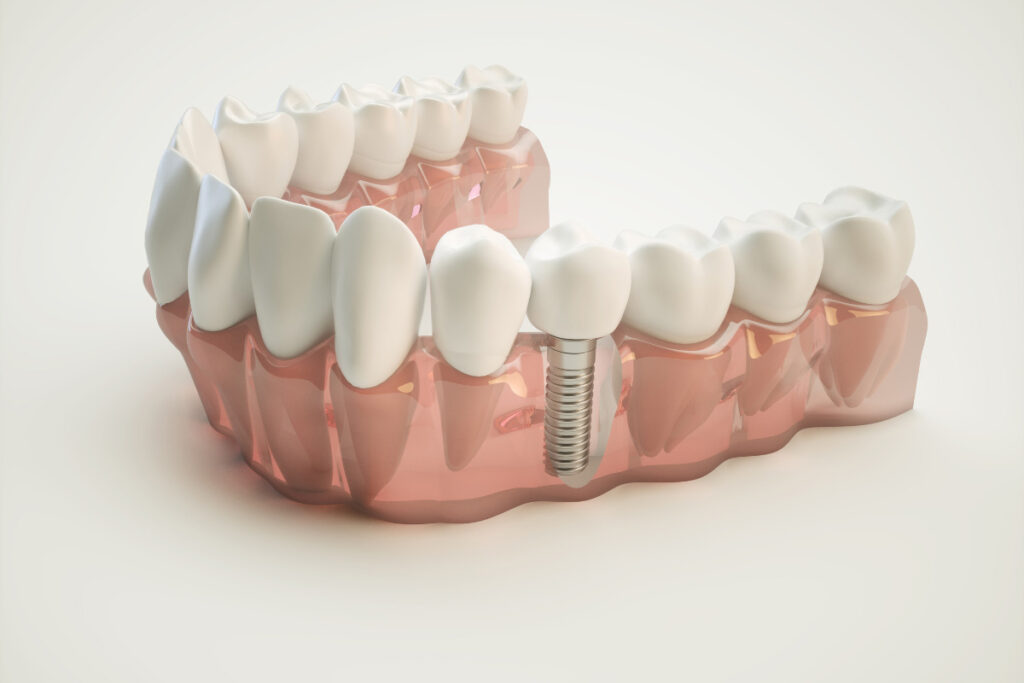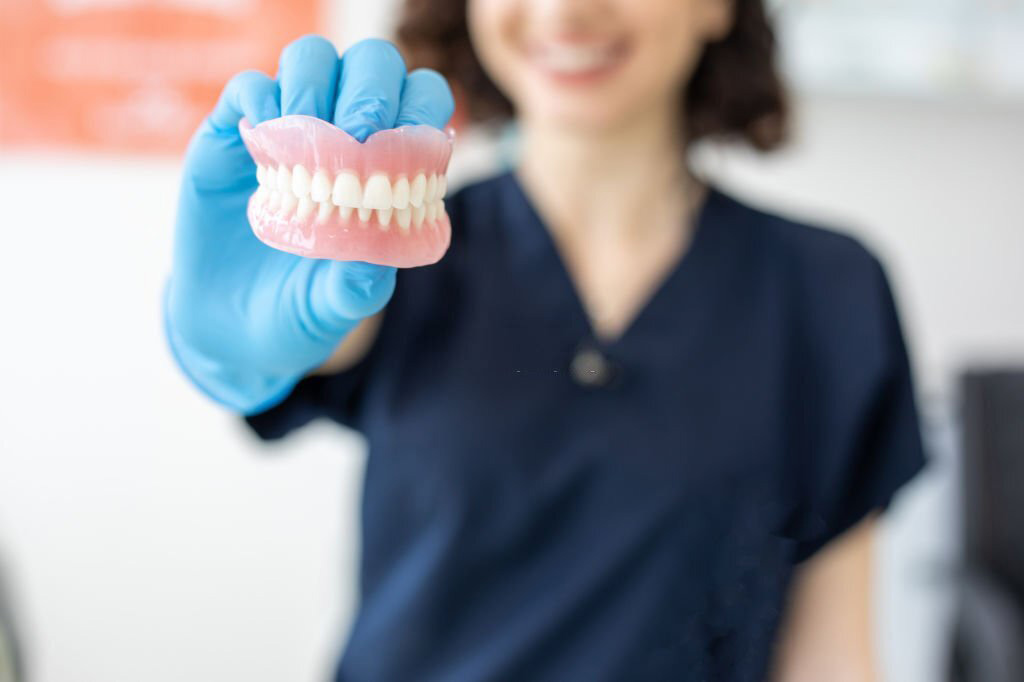Imagine waking up one morning, looking in the mirror, and realizing that your teeth are no longer what they used to be. They are worn down, chipped, or missing altogether. You may find it difficult to chew your food properly or feel self-conscious about your smile. If this scenario sounds familiar, you may be considering dentures or dental implants as a solution to your dental problems. In this blog post, we will explore the pros and cons of each option, discuss when one may be a better choice than the other, and provide helpful information to guide you in making the right decision for your oral health.
Dental implants are a modern and permanent solution for replacing missing teeth. This procedure involves surgically placing titanium posts into the jawbone, which act as artificial tooth roots. These posts serve as a foundation for attaching custom-made dental crowns that closely resemble natural teeth. Dental implants offer a long-lasting and natural-looking alternative to dentures, providing stability and functionality similar to that of natural teeth.
One of the primary advantages of dental implants is their ability to prevent bone loss in the jaw. When a tooth is missing, the underlying bone may deteriorate over time. Dental implants stimulate the jawbone, preventing bone loss and maintaining the natural shape of the face. Additionally, unlike dentures, dental implants do not require any special cleaning or maintenance beyond regular oral hygiene practices.
However, dental implants do have some drawbacks. The procedure can be costly, and it requires multiple visits to the dentist over several months. In some cases, additional procedures such as bone grafting may be necessary to ensure the implant's success. Dental implants also require a sufficient amount of jawbone for successful placement, which may not be possible for individuals with significant bone loss.

Dental implants are often considered a better option for individuals who have a healthy jawbone and are looking for a permanent solution to their missing teeth. If you have good oral health and are willing to invest in a long-term solution, dental implants can provide you with a natural-looking and durable smile.
Furthermore, dental implants are an excellent choice for individuals who want to regain their ability to eat a wide variety of foods without restrictions. Unlike dentures, which can sometimes slip or cause discomfort while eating, dental implants provide stability and confidence when chewing tough or sticky foods.
It is important to note that dental implants may not be suitable for everyone. If you have oral health issues such as gum disease or significant bone loss, your dentist may recommend alternative treatments or procedures to address these concerns before considering dental implants.
Dentures, also known as false teeth, are removable appliances used to replace missing teeth and their surrounding tissues. They consist of a gum-colored acrylic base that supports a set of artificial teeth. Dentures can be complete, replacing all teeth in the upper or lower jaw, or partial, replacing only a few missing teeth.
Dentures offer several advantages, including their affordability and the relatively quick process of obtaining them. Unlike dental implants, which require surgical procedures and a longer healing period, dentures can be fitted and worn within a few weeks. Additionally, dentures can be adjusted or replaced if necessary, making them a more flexible option for those who may experience changes in their oral health over time.
However, dentures do have some drawbacks. They may feel less natural and secure compared to dental implants, as they can sometimes slip or move while speaking or eating. They also require regular cleaning and maintenance, including soaking them overnight in a denture cleaner or water. Some individuals may also experience discomfort or soreness due to pressure points on the gums caused by the denture's base.

The process of getting dentures involves several steps. Initially, your dentist will take impressions of your mouth to create a custom mold for your dentures. This mold is then sent to a dental laboratory, where technicians fabricate the dentures to fit your unique oral structure. Once the dentures are ready, your dentist will make any necessary adjustments to ensure a proper fit.
On the other hand, the procedure for dental implants requires multiple visits to the dentist and a more extensive process. First, the dental implant posts are surgically placed into the jawbone. After a healing period of a few months, during which the implant fuses with the bone, abutments are attached to the posts. Finally, the custom-made dental crowns are affixed to the abutments, completing the implant restoration.
It is essential to discuss the specific steps and timelines with your dentist to understand the process and timeline for each treatment option.
The main difference between dentures and dental implants lies in their permanence and functionality. Dentures are removable appliances that rest on the gums, whereas dental implants are surgically placed into the jawbone, providing a permanent and stable foundation for artificial teeth.
Dentures offer a more affordable and less invasive option for replacing missing teeth, while dental implants provide a long-lasting and natural-looking alternative that closely mimics the function and appearance of natural teeth. Additionally, dental implants help preserve the jawbone, while dentures do not stimulate the underlying bone.
When deciding between dentures and dental implants, several factors should be taken into consideration:
Oral Health: If you have gum disease or significant bone loss, dental implants may not be a feasible option. In such cases, dentures or alternative treatments may be recommended.
Cost: Dental implants are generally more expensive than dentures due to the surgical procedures involved. Consider your budget and whether you have dental insurance coverage that may help offset the costs.
Long-term Goals: If you are looking for a permanent and durable solution, dental implants may be the better choice. However, if you anticipate changes in your oral health or prefer a more affordable and flexible option, dentures may be more suitable.
Lifestyle: Consider your eating habits, speech patterns, and overall comfort. Dental implants offer greater stability and functionality, especially while eating, speaking, or participating in physical activities.
Yes, there are alternative treatments for replacing missing teeth. Some options include:
Dental Bridges: Dental bridges are fixed appliances that replace one or more missing teeth by attaching artificial teeth to the adjacent natural teeth.
Removable Partial Dentures: Similar to dentures, removable partial dentures are used to replace multiple missing teeth but are secured to the natural teeth using metal clasps.
Implant-Supported Dentures: These dentures are supported by dental implants, providing greater stability and reducing the risk of slippage or discomfort.
It is essential to consult with your dentist to determine which treatment option best suits your specific needs and oral health condition.
Choosing between dentures and dental implants is a significant decision that should be based on various factors, including your oral health, budget, long-term goals, and lifestyle. Dental implants offer a permanent and natural-looking solution but come with a higher cost and more extensive procedure. Dentures, on the other hand, are more affordable and offer flexibility but may feel less secure. Consider discussing your options with a dentist to determine the best course of action for your individual needs. Ultimately, whether you choose dentures or dental implants, the goal is to regain your smile and confidence, and enjoy the benefits of a healthy and functional mouth.

